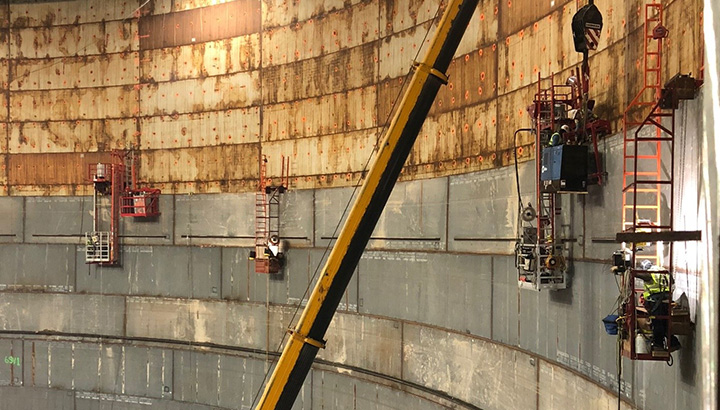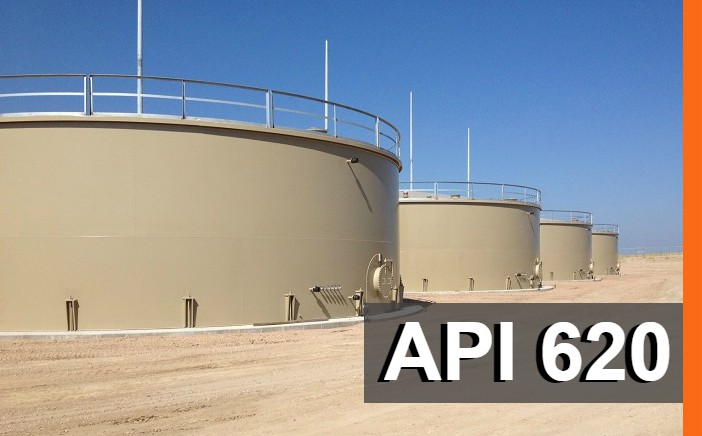Discover the Essentials of API 650 Welding Inspection for High-Quality Industrial Projects
The Benefits of Welding Examination for Improved Security and Performance
Welding inspections are important for ensuring that frameworks satisfy strict industry criteria. They play an essential duty in recognizing problems early, thus enhancing safety and security and minimizing the danger of catastrophic failings. Furthermore, these evaluations can bring about substantial expense savings by protecting against expensive repairs and downtime. As companies aim for improved efficiency and dependability, the significance of a robust inspection procedure can not be overstated. What various other benefits might arise from a commitment to thorough welding examinations?
Ensuring Conformity With Industry Specifications
Guaranteeing conformity with industry standards is essential for preserving quality and security in welding projects. Complying with established procedures not just safeguards workers yet also improves the durability and efficiency of the last product. Welding assessments performed at numerous stages of the procedure aid identify any type of inconsistencies from these standards, allowing prompt restorative activities. This proactive method alleviates the threat of failures that could result from ineffective craftsmanship.
Furthermore, compliance with industry requirements promotes trust fund among stakeholders, including clients, regulatory bodies, and the labor force. It indicates a dedication to quality and accountable techniques, which can lead to increased business opportunities and an one-upmanship on the market - API 650 Welding Inspection. Routine assessments likewise ensure that materials and methods used straighten with the most up to date technical innovations and safety and security laws. Inevitably, adherence to market requirements is not merely a regulatory requirement yet a keystone of high quality assurance in welding projects
Enhancing Safety And Security With Early Detection of Issues
While the key objective of welding evaluations frequently fixates conformity, they play a vital function in enhancing safety and security by allowing the early discovery of flaws. Determining issues such as insufficient fusion, splits, or porosity throughout evaluations can greatly alleviate the risk of catastrophic failings. Early detection permits for timely treatments, making sure that defective welds do not endanger structural integrity.
Furthermore, systematic examinations foster a society of safety and security within companies by emphasizing the value of quality assurance. This aggressive approach not just secures personnel yet also safeguards the surrounding setting. Regular assessments can reveal patterns in issue occurrence, permitting adjustments in welding strategies and training programs to attend to underlying issues.
Welding assessments offer as an important safeguard, reinforcing general safety and security and performance by identifying problems prior to they rise right into serious risks. This commitment to high quality straight adds to the long life and integrity of welded frameworks.
Lowering Costs by Preventing Failures
By executing complete welding examinations, companies can effectively decrease expenses connected with failures and revamp. The aggressive recognition of issues throughout the welding procedure lessens the threat of tragic failures that can lead to costly repairs or replacements. Early discovery permits prompt interventions, which prevents the rise of small problems into major issues that strain sources and spending plans. Furthermore, by making sure that welds satisfy specified criteria, organizations can prevent delays in task timelines created by the requirement for comprehensive rework or additional examinations later on at the same time. This not just saves cash however also enhances functional effectiveness. Moreover, a reputation for quality handiwork can cause enhanced consumer contentment and repeat company, further adding to financial security. Generally, purchasing welding examinations is a strategic method that fosters price savings while securing the stability of bonded structures.
Improving Performance and Long Life of Structures


Welding inspections play a vital duty in boosting the efficiency and longevity of structures, as they confirm that welds are carried out to the greatest criteria. By recognizing problems early in the welding procedure, examinations protect against weak points that can compromise structural integrity. This proactive approach warranties that the products made use of fulfill called for requirements, therefore maximizing their load-bearing ability and strength.
In addition, regular tracking of welding methods contributes to the overall quality of construction tasks. The capacity for tiredness and failure over time is substantially lowered when welds are confirmed for compliance with market criteria. Frameworks that are built with properly evaluated welds are likely to experience less upkeep problems and enhanced longevity.
Eventually, rigorous welding inspections not only bolster the instant effectiveness of a framework but likewise extend its functional life-span, offering lasting value to both building contractors and end-users alike.
Cultivating a Society of High Quality and Integrity
A commitment to high quality and reliability in welding methods substantially adds to the total success of construction jobs. When companies prioritize these worths, they promote a society that encourages careful focus to detail and adherence to market criteria. This culture not only improves the ability degree of welders however additionally advertises accountability and team effort amongst all stakeholders entailed in the task.

Normal welding assessments offer as a keystone in this social shift, strengthening the significance of constant performance and precaution (API 650 Welding Inspection). By implementing extensive assessment procedures, companies can identify possible imperfections early, mitigating threats and preventing expensive rework. A focus on quality and integrity imparts confidence amongst companions and clients, leading to more powerful connections and improved credibilities.
Inevitably, promoting a culture of high quality and reliability in welding techniques visite site not only boosts job outcomes yet also assures long-lasting sustainability and success in the construction market.
Frequently Asked Concerns
What Qualifications Should a Welding Examiner Have?
A welding inspector must have relevant accreditations, such as AWS CWI or CSWIP. In addition, they ought to have experience in metallurgy, welding procedures, and examination techniques, together with solid logical abilities and focus to detail for efficient examinations.

Just How Often Should Welding Inspections Be Conducted?
Welding evaluations ought to be carried out regularly, ideally after each significant phase of the welding procedure. Furthermore, routine examinations need to take place based upon job demands, solution problems, and regulatory requirements to ensure continuous quality and security.
What Equipment Are Used Throughout Welding Inspections?
Welding inspections use various tools, consisting of ultrasonic testers, magnetic bit testers, visual evaluation view it devices, and radiographic tools. Each tool offers a details function, guaranteeing weld quality and architectural stability through thorough exam and evaluation.
Can Welding Inspections Be Carried Out Remotely?
Welding examinations can certainly be performed from another location utilizing advanced innovations such as drones and specialized video cameras. These devices allow inspectors to examine welding quality and honesty from a distance, boosting efficiency and safety and security in different settings.
What Are the Typical Sorts Of Welding Problems?
Usual types of welding issues include porosity, splits, incomplete blend, damaging, and slag inclusion. These issues can compromise the stability and strength of welds, causing possible failures in architectural applications otherwise dealt with effectively.
Welding evaluations are crucial for ensuring that structures satisfy stringent industry requirements. Welding inspections conducted at different phases of the process help determine any kind of inconsistencies from these standards, why not find out more allowing prompt rehabilitative actions. Welding evaluations play a necessary duty in enhancing the performance and durability of structures, as they verify that welds are implemented to the highest possible criteria. Welding inspections ought to be carried out on a regular basis, preferably after each substantial stage of the welding procedure. API 650 Welding Inspection. Welding inspections utilize various tools, including ultrasonic testers, magnetic fragment testers, aesthetic inspection devices, and radiographic equipment